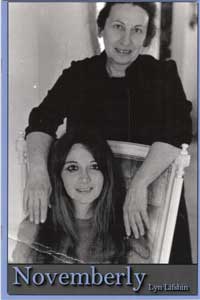Novemberlyby Lyn Lifshine.s.p. press This book was small press choice for March - April, 2008 -- it
can be ordered from ESP press or Nessaralindaran@aol.com |
 |
ReviewYou have to wonder when the woman has time to dry her hair….but then you figure she’s just letting that long lavish mane dry in whatever wind comes along. Why can’t I picture Lyn Lifshin with a blow dryer in her hand anyway? One of the most prolific poets of our time, Lifshin has put out a new chapbook called Novembery, on e.s.p. press. It draws its images and free verse (dribbled like a careful sandcastle in lines usually 3-4 words long) from this time in her life, and a major relationship of her past. – her relationship with her mother. At first, Lifshin writes as if she’s managing a time lapse photo, each poem a slightly different unfolding of the themes of the one before, each one contributing to our deepening sense of the entire subject. Thematic and lyrical – as many but not all of her works are – Novemberly starts with a “night drive from Austerlitz/an hour north to bring in my plants/early September….” The poem introduces the geraniums which are recast in the succeeding poems, as if they were so real as to be animals….”geraniums under a quilt last night, a blotch of red opening/on the front steps what looked like lint/ has small pink claws and feet.,” from the first poem of the collection: Today, Longing for Upstate, Unseasonably Cold, Highs only in the Mid Thirties.” She draws from Greek mythology in the poem, “Maybe but it Feels More Septemberly” in writing about herself as Persephone, the goddess who must spend six months in the underworld before her mother Demeter draws her back up into the earth’s arms: “under my hair I’m /Persephone, not quite/ up for so much bloom,/ I feel more like some/ thing dark under layers/ of night, the brown/ seeds of silver dollars…” Something like a swift and deftly traced travelogue of that fall-time, she includes poems about her sister as well at the time of her mother’s death – the recriminations one can feel within a family in “The Images, the Faces, My Sister’s Eyes,” when there are “15 years no truce, no phone.” Furthermore she writes, “I stopped the cards. ‘You murdered the victims twice’ she squealed at a last funeral. Someone said my face turned snow.” We can feel the sting of reproach in the compactness of the last sentence. Again Lifshin turns to the oncoming season of winter, her face turning into snow to match it. Like a Bergman film clip, she repeats the scene in the next poem, “Another Woman who Looks like my Sister,” “dove grey eyes or/ maybe the sea/ruby birth, the same blood we share /but of course don’t/It made it easier,/ what you said, /knifed what I’d /have needed /to go on/….Your /scream shriek,/ then, face distorted/ I didn’t know you.” Her sister, in her hateful and shocked explosion, literally becomes something else, an abstraction, another woman to Lyn Lifshin. She documents the turning points in her mother’s aging. “I Lift my Mother to the Commode,” describes a heart-wrenching moment when her mother losses mobility and Lyn and a stranger help her. “Our/ awkward dance to lift /her hopeless as prayers/ for mercy, a reprieve/ but I try to not show my/ fear and now see her/ tremble as the doorbell/ rings, Verizon, to install/ a private line she’ll be/ alive less than a week to/ use. Still on the commode,/ my stranded mother is/ lifted by the smiling man /as if it was part of every/ day’s phone service,/ gently as if carrying /a bride over the threshold/ for a new life.” In this way, Lifshin again conjures an elegant travail – like a dancer on a beam of light.-- out of a moment many of us would find humiliating and awful. The arc of the book, from Lyn’s remembering her mother alive, her funeral scenes that flash by with her estrangement to her sister, and Lyn always seeing herself a figure in the midst with emails and boxes to pack and feelings to explore like her plants, we come back to a poem about Lyn’s illustrious mane of hair, as if it were part of the trademark of her many extensions of living from roots to fly-away ends. In “The Mad Girl has Butterflies in her Hair,” she writes, “not just Monarchs/ but owl butterflies, swallow/ tails, mourning cloaks,/ viceroys and painted/ ladies. Wings brush/ her skin….” The chapbook includes several lovely photos of Lyn’s mother and herself, as both child and adult. It is a book like the sign of Virgo, entreating us like a deceptively small white rose. I am always a fan. Lo Galluccio |
|
Message from the publisher:We are excited to announce the publication of our first poetry chapbook: Novemberly by Lyn Lifshin. Novemberly is an intimate and important collection by my favorite poet. It is my honor to have worked with Lyn in publishing this book. You can preview the collection in our Spring 2007 issue. If you want to support Abramelin and the small press, this is a fantastic opportunity to do so. The first 20 people who order Novemberly online will receive a FREE copy of the first edition of my collection, Apart. This is precious to me because I greatly prefer it to the 2nd edition. But I'm going all out to promote Lyn's work. It deserves to be read. After the Aparts are gone, I will offer 50% off our Print edition of Abramelin 2007 for anyone who orders Novemberly. Have a magickal day! Sincerely, Shushan |
|